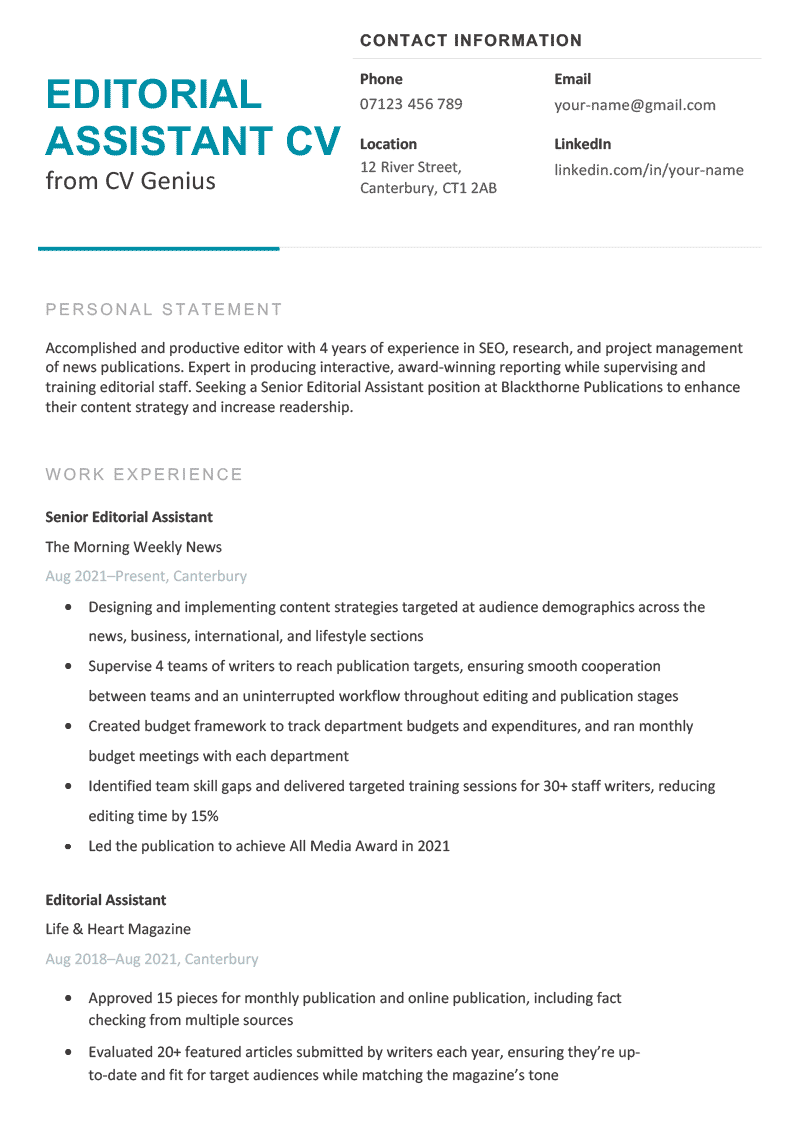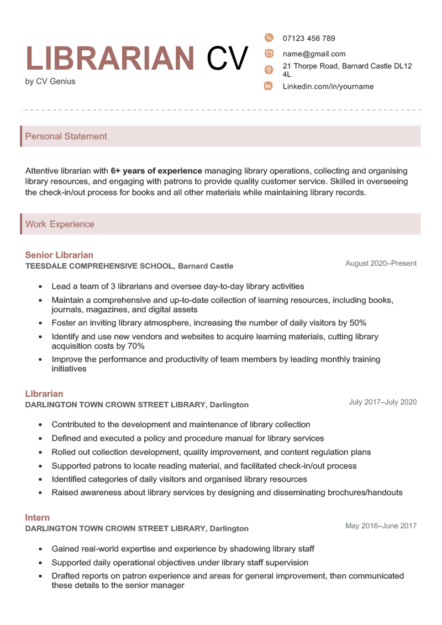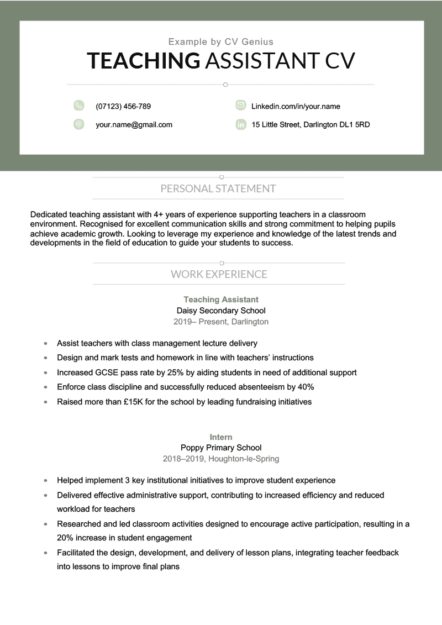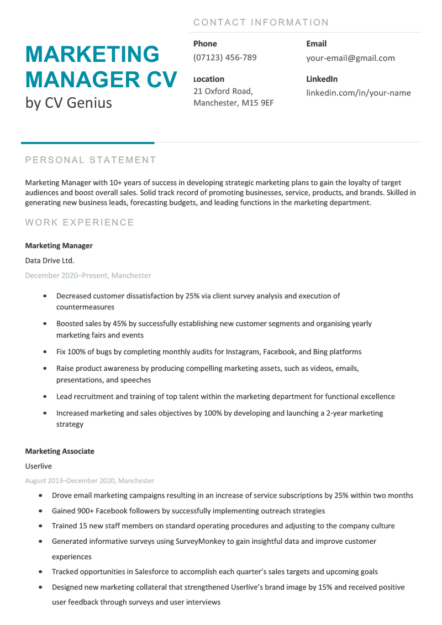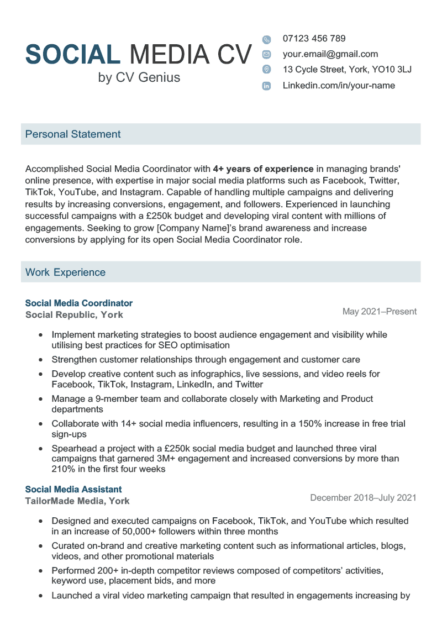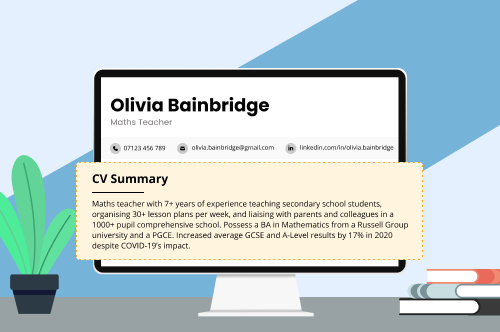Ensure your CV layout is structured to best highlight your unique experience and life situation.
Editorial CV Template (Text Format)
PERSONAL STATEMENT
Accomplished and productive editor with 4 years of experience in SEO, research, and project management of news publications. Expert in producing interactive, award-winning reporting while supervising and training editorial staff. Seeking a Senior Editorial Assistant position at Blackthorne Publications to enhance their content strategy and increase readership.
WORK EXPERIENCE
Senior Editorial Assistant
The Morning Weekly News
Aug 2021–Present, Canterbury
- Designing and implementing content strategies targeted at audience demographics across the news, business, international, and lifestyle sections
- Supervise 4 teams of writers to reach publication targets, ensuring smooth cooperation between teams and an uninterrupted workflow throughout editing and publication stages
- Created budget framework to track department budgets and expenditures, and ran monthly budget meetings with each department
- Identified team skill gaps and delivered targeted training sessions for 30+ staff writers, reducing editing time by 15%
- Led the publication to achieve All Media Award in 2021
Editorial Assistant
Life & Heart Magazine
Aug 2018–Aug 2021, Canterbury
- Approved 15 pieces for monthly publication and online publication, including fact checking from multiple sources
- Evaluated 20+ featured articles submitted by writers each year, ensuring they’re up-to-date and fit for target audiences while matching the magazine’s tone
- Assessed manuscripts and proposals for 100+ articles, including preparing written feedback reports and providing constructive feedback for each writer
- Introduced weekly content coordination meetings between editing, design, and tech departments, which cut publication delays by 80%
- Increased website traffic by 200% by optimising each article using SEO practices and aligning the content calendar with current trends based on detailed research
EDUCATION
BA (Hons), Media and Communications, first class honours
University of West London, 2012–2015
Dissertation topic: Social Theory in Media Studies
KEY SKILLS
- Microsoft Office and Google Workspace
- SEO and copywriting
- Strategy development
HOBBIES & INTERESTS
- Reading dystopian fiction
- Baking
- Playing tennis
How to write an editorial assistant CV
Before you begin writing, make sure you know how to write a CV in a way that best emphasises your strengths.
Powerful writing can influence your readers to read every word you produce — especially in the editorial business. So you’ll need to apply your well-honed attention to detail and editing skills to engage your next employer by writing an effective editorial assistant CV.
But editors of all experience levels can come across challenges when writing a CV.
Here are four tips to ensure your editorial assistant CV makes a good impression on employers and gets you hired.
1. Choose an appropriate editorial CV layout
In the same way that a well-laid-out article is a pleasure to read, the right CV layout keeps employers reading for longer. However, poor formatting can put them off reading your CV, which means they won’t read about all your editing-related skills and achievements.
So how do you format a winning editorial assistant CV? Pay attention to these three areas:
- Choice of font: Your CV font should be easy to read, so keep your CV’s text between 10–12 points so your CV’s contents don’t look too cramped or too spaced out. Classic choices are Times New Roman, Arial, and Calibri because they look clear and professional.
- Appropriate spacing: The white space on a page guides an employer’s eyes across the page and allows key points to jump out. So use standard 2.5 cm margins, and set your line spacing to 1.5 so your CV is clear and easy to read.
- Professional format: Make it easy for the HR manager to find the information they’re looking for by using a chronological CV. This CV format lets you list your work experience starting with your most recent experience at the top and then mention your older positions in descending order.
- Use an online CV maker: Online CV makers automatically choose the right format for your CV depending on the content you add to it, so there’s no more fiddling with margins or spacing.
2. Create a powerful editorial personal statement
An excellent editorial assistant CV begins with a powerful personal statement. A CV personal statement showcases your qualities, skills, and experience to the employer so they can immediately see what positive qualities and skills you’d bring to their company.
Your personal statement should be 2–4 sentences long and focus on what the company is looking for from the editorial role so you can prove you’re a good contender for the job.
To make a powerful personal statement for your editorial CV, follow these five tips:
- begin with CV adjectives that showcase your skills as an editor (e.g., detail-oriented, capable)
- describe yourself as an editor, editorial assistant, or the job title you’re applying for
- mention how many years of experience you have (if applicable)
- highlight some key accomplishments
- tell them what you want to achieve in their company
Here’s an example of a well-written CV personal statement for an editorial assistant:
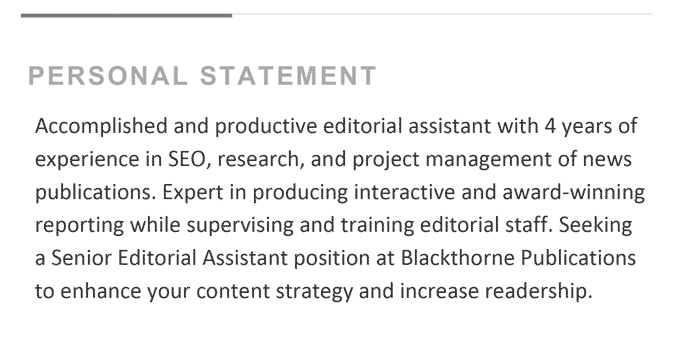
3. Showcase your editorial CV skills
Employers scan numerous editorial CVs to choose the best candidates for an interview, so they’ll pay close attention to your skills section. Businesses look for hard and soft skills on your CV to show them you’ve got the abilities it takes to make a positive contribution to their team of content creators.
Hard skills are the technical skills that make you a great editor. You develop hard skills through training, education, and practical experience.
For instance, being knowledgeable in grammar and Chicago, MLA, and APA style guidelines are valuable hard skills for editors.
Other hard skills for an editorial CV include:
- Copywriting
- Marketing
- Search engine optimisation (SEO)
- Writer training
- Word processing software (Microsoft Office, Google Workspace)
- CMS software (Monday, Slack, Asana)
When writing out your skills, adapt the list to the position you’re applying for by using keywords and phrases from the job description to catch the employer’s attention.
By contrast, soft skills are personality traits that show how you relate to your colleagues or clients. If hard skills tell employers what you can do, soft skills tell them how you go about doing that work.
For example, paying good attention to detail is essential for editorial assistants when it comes to catching errors and typos on documents. Also, editorial assistants often work closely with other editors, so list your teamwork skills and communication skills on your CV.
Here are some soft skills that you can highlight on your CV as an editor:
- Interpersonal skills
- Creative thinking
- Good judgment
- Detail oriented
- Time management
- Leadership skills
- Organisational skills
Also, highlighting your soft skills in your work experience section is a great way to show how each of these skills contributes to your role as an editorial assistant.
For example, this work experience bullet point successfully highlights an editorial assistant’s time management skills:
4. Highlight your relevant editorial work experience
Your editorial work experience is an essential addition to your CV. While your CV’s education section is important in providing you with the techniques you need to excel as an editor, your CV work experience section tells your new employer what they can expect of you if they hire you.
For each of your editorial positions, you should include your:
- job title
- publication or company name
- start and end dates (either as years or months and years)
- bullet points related to your role
Work experience bullet points give context to your editorial skills and demonstrate your career achievements. Avoid simply listing your responsibilities and duties, because your new employer already knows what’s expected of an editor.
Instead, think about the hard skills or soft skills you want to illustrate as well as your achievements as an editor. Then, ensure you:
- start the sentence with a bold action verb
- frame your point as a benefit to the employer, rather than a part of your job description
- add hard numbers like percentages, revenue earned, or time saved to quantify the scope of your role or any improvements you made
Here are two examples of editorial work experience bullet points using this approach:
- Increased website traffic by 200% by optimising articles using SEO practices and aligning the content calendar based on current trends
- Identified skill gaps within the team and implemented targeted training sessions for 30+ staff writers, reducing editing time by 15%
Showcase your writing end editorial skills by creating a cover letter — they’re standard in the industry.
